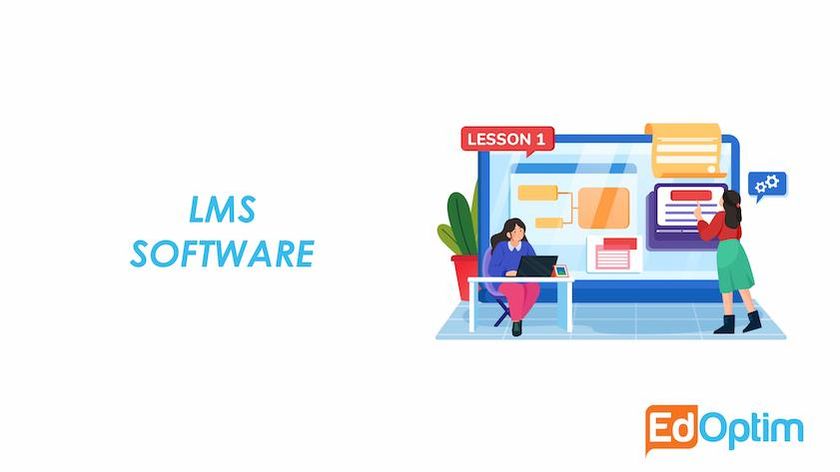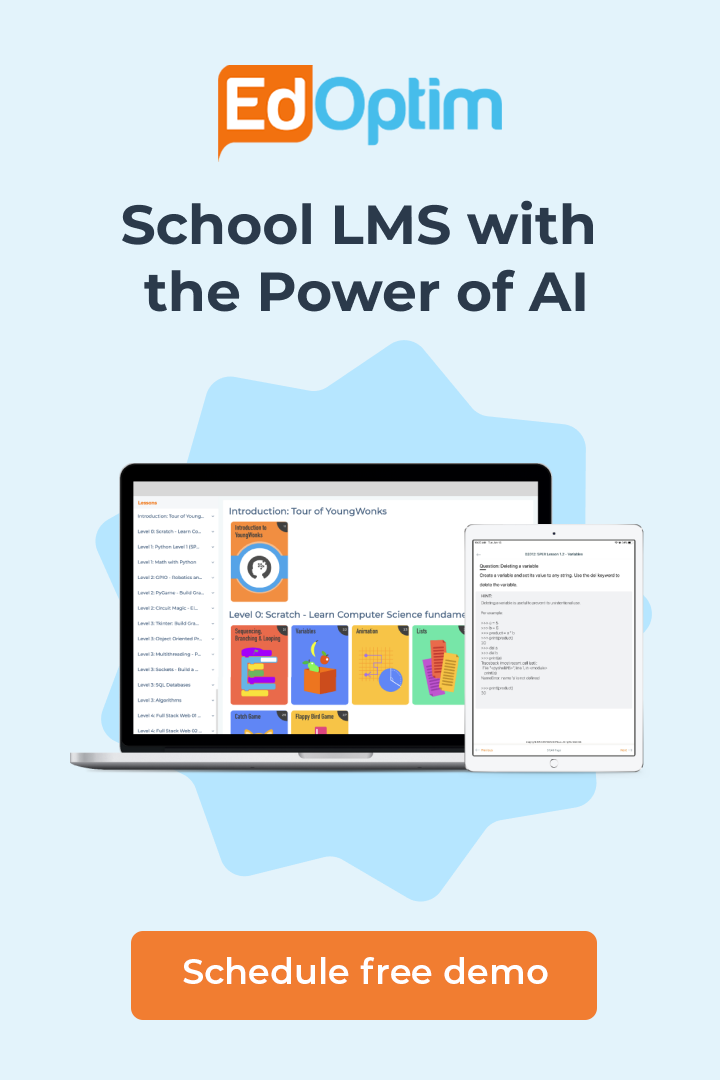Jul 01, 2024 By Team EdOptim *
In recent years, the landscape of education and corporate training in India has undergone a significant transformation, largely driven by the widespread adoption of Learning Management Systems (LMS). These platforms have become indispensable tools, catering not only to the burgeoning demand for online courses but also to the critical need for efficient employee training programs across industries. As eLearning solutions gain momentum, the best LMS platforms in India have emerged as pivotal facilitators, offering a myriad of modules and features designed to enhance learning experiences. These platforms support a wide array of learning programs, from structured courses to specialized modules, empowering organizations to manage their training initiatives effectively. They provide robust LMS systems that are web-based, allowing seamless access to training materials and resources from anywhere. Moreover, the self-paced learning options offered by these platforms cater to the diverse learning preferences of individuals and teams alike. They excel in delivering comprehensive training management software that ensures content remains up-to-date and accessible, fostering continuous learning and skill development. As India continues to embrace digital education and corporate training as essential components of growth and development, these advanced LMS solutions play a crucial role in shaping the future of learning across the country.
What is an LMS?
A Learning Management System (LMS) is a software application designed to manage, deliver, and track educational courses or training programs. It provides learners and instructors with a central hub for online learning, including features for course management, assessments, and real-time communication.
Integrations: These leading LMS platforms offer seamless integration capabilities with a wide array of tools and systems, including CRM, HR software, and eCommerce platforms. This ensures that organizations can consolidate their operations and data management efficiently.
Functionality: Known for their extensive functionality, these platforms provide comprehensive tools such as quizzes, gamification elements, real-time notifications, and robust multimedia support. These features enhance engagement and interaction within learning environments, promoting effective knowledge retention.
User Interface: The emphasis on user-friendly interfaces significantly enhances the overall learning experience. Intuitive designs and navigation structures ensure that learners and administrators can easily navigate through courses, assessments, and administrative tasks with minimal training.
Mobile Learning: Recognizing the importance of flexibility, top LMS platforms incorporate mobile learning capabilities. Mobile apps enable learners to access course materials and participate in activities from anywhere, facilitating on-the-go learning experiences that align with modern lifestyles.
Cloud-Based: Leveraging cloud technology, these platforms offer scalability and accessibility benefits. Cloud-based LMS solutions empower organizations to expand their training initiatives without the constraints of physical infrastructure, supporting remote learning initiatives seamlessly.
Content Management: Advanced tools for content creation, management, and authoring empower educators and trainers to develop engaging and personalized learning materials. These capabilities streamline the process of updating content and ensuring its relevance across different learning modules.
Collaborative Learning: Promoting social learning environments, these platforms integrate features such as discussion forums, collaborative tools, and interactive webinars. These functionalities foster peer-to-peer interaction and knowledge sharing, enriching the overall learning experience with collaborative learning opportunities.
Best LMS Software in India
1.EdOptim
EdOptim is a Student Information System (SIS), Learning Management System (LMS), and parent engagement featured software with cutting-edge AI capabilities. These AI features cover everything from creating lesson plans and generating homework assignments to simplifying homework reviews and providing chatbot support for students, staff, and parents with extensive and flexible features for all your needs. ,Schedule a demo
2. Moodle
Moodle is an open-source LMS that offers extensive customization options. It is widely used in educational institutions and supports a wide range of functionalities including course management, assessments, and collaborative tools. Its robust community and plethora of plugins make it a versatile choice for many users. Moodle's content management capabilities allow educators to create and organize learning materials easily. Additionally, its scalability and flexibility make it ideal for both small and large institutions.
3. TalentLMS
TalentLMS is known for its user-friendly interface and ease of use. It supports various learning formats and offers features like gamification, mobile learning, and integrations with other tools. TalentLMS is suitable for both educational institutions and corporate training programs. Its cloud-based nature ensures that learning materials are always accessible, and its gamification features help keep learners engaged. TalentLMS also excels in providing comprehensive support for mobile learning, making it an ideal choice for learners who prefer studying on the go.
4. Paradiso LMS
Paradiso LMS is a cloud-based LMS solution that provides an end-to-end learning platform. It includes features like course management, learning paths, blended learning, and social learning. Paradiso LMS also supports integrations with various third-party applications and offers a scalable solution for large organizations. Its real-time notifications keep learners updated on their progress, and its user interface is designed to be intuitive and easy to navigate. Paradiso LMS's ability to integrate with eCommerce platforms makes it a great choice for institutions looking to monetize their courses.
5. Docebo
Docebo is a leading LMS platform known for its AI-powered functionalities. It offers a comprehensive suite of tools for content management, user engagement, and analytics. Docebo's intuitive user interface and powerful integrations make it a top choice for corporate training and employee onboarding. Its social learning features encourage collaboration and knowledge sharing among employees. Docebo's advanced analytics provide insights into learner performance, helping organizations tailor their training programs for maximum effectiveness.
6. LearnUpon
LearnUpon is a cloud-based LMS that focuses on delivering a seamless learning experience. It offers a wide range of features including course creation, assessments, notifications, and reporting. LearnUpon is designed to cater to both educational institutions and businesses, making it a versatile option. Its ease of use and robust customer support make it a reliable choice for organizations looking to implement an effective LMS solution. LearnUpon's ability to support various learning formats ensures that it can meet the diverse needs of its users.
Benefits of Using an LMS in India
Scalability: Cloud-based LMS platforms are designed to effortlessly expand and accommodate a growing number of users and courses. This scalability ensures that educational institutions and organizations can scale their training programs without encountering limitations, thereby supporting continuous growth and evolving learning needs.
Accessibility: The accessibility of online learning materials and mobile apps empowers learners by providing them with unrestricted access to educational content anytime and from any location. This flexibility not only enhances convenience but also facilitates learning opportunities for individuals who may have geographical constraints or varying schedules, promoting inclusivity in education.
Efficiency: Automated features such as enrollment processes, progress tracking, and comprehensive reporting significantly streamline administrative tasks within the learning environment. By automating these processes, educators and administrators can allocate more time to curriculum development, teaching, and supporting learners, ultimately improving overall operational efficiency.
Engagement: Modern LMS platforms integrate interactive elements like quizzes, gamification tools, and social learning functionalities to foster active learner engagement. These interactive features create immersive learning experiences that captivate learners' interest, promote participation, and enhance knowledge retention, thereby enriching the overall educational outcomes.
Customization: Open-source and customizable LMS platforms such as Moodle offer institutions the flexibility to tailor the learning management system according to their specific educational objectives and organizational requirements. This customization capability enables institutions to align the LMS closely with their unique teaching methodologies, curriculum structures, and learner preferences, ensuring a personalized and effective learning experience.
Choosing the Best LMS for Your Needs
When selecting an LMS, consider the following factors:
User Reviews: Gathering feedback from other users provides valuable insights into the reliability, usability, and overall performance of an LMS. Reviews help gauge user satisfaction, identify potential issues, and assess whether the platform meets expectations in real-world applications.
Customer Support: Robust customer support is essential to promptly address any technical issues or challenges that may arise during implementation or daily use. Ensuring that your LMS provider offers reliable support ensures smooth operation and minimizes disruptions to learning activities.
Pricing: Evaluating pricing models is critical to choosing an LMS that fits within your organization's budget while offering the necessary features and functionalities. Understanding the cost structure, including any potential additional fees or customization options, helps in making an informed financial decision.
Integration Capabilities: Check the LMS's compatibility and integration capabilities with your existing systems, tools, and platforms. Seamless integration facilitates efficient data exchange, streamlines workflows, and enhances overall operational efficiency within your organization.
Scalability: Opt for an LMS platform that can scale alongside your organization's growth and adapt to evolving educational or training needs. Scalability ensures that the LMS remains effective and efficient as user numbers increase and as new learning initiatives are introduced.
Conclusion
India's eLearning and corporate training landscape is not only evolving but also expanding at a rapid pace. The adoption of Learning Management Systems (LMS) like Moodle, TalentLMS, Paradiso LMS, Docebo, and LearnUpon plays a crucial role in this transformation. These platforms offer a plethora of features designed to cater to diverse learning environments and organizational needs. Whether it's delivering online courses with interactive modules and self-paced learning, facilitating employee training with web-based tools and comprehensive management software, or managing eLearning content and training materials effectively, the right LMS can significantly enhance educational outcomes and workforce development initiatives. By leveraging the strengths of these LMS platforms—such as scalability, customization, and robust integration capabilities—educators and corporate trainers can create tailored learning programs that engage learners, improve retention rates, and foster continuous professional growth. As organizations in India embrace digital learning solutions, choosing the best LMS involves assessing these platforms' functionalities in alignment with specific educational goals and training objectives, ensuring a seamless and impactful learning experience for all stakeholders involved.
*Contributors: Written and Edited by Alisha Ahmed; Lead image by Shivendra Singh

